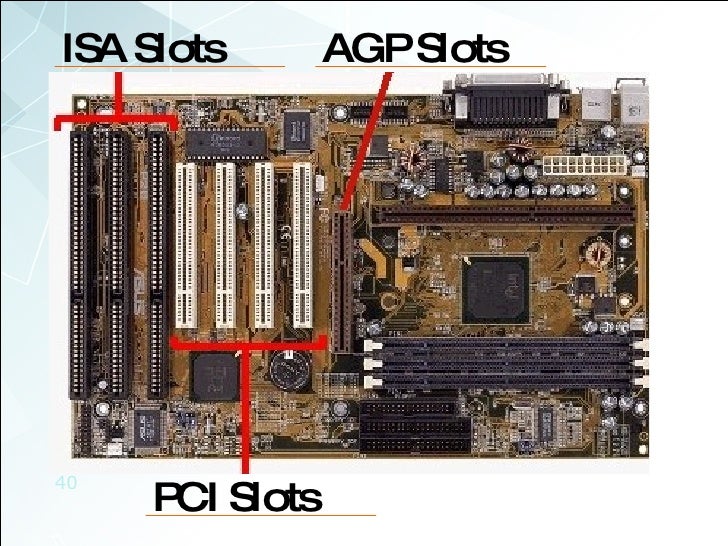Slot De Expansion Isa
Alternatively known as a bus slot or expansion port, an expansion slot is a connection or port inside a computer on the motherboard or riser card. It provides an installation point for a hardware expansion card to be connected. For example, if you wanted to install a new video card in the computer, you'd purchase a video expansion card and install that card into the compatible expansion slot.

Adding additional expansion slots for older motherboards could be accomplished by using a riser board, which would add several ISA or PCI slots. Today, riser boards are rarely used with motherboards, as there is limited need for additional expansion slots with modern motherboards. EISA (Extended Industry Standard Architecture) or (Enhanced ISA) bus: 8MHz @ 8/16/32 bits data bus, 32 bit address bus; PC Expansion Bus, compatible with ISA. An ISA card will work in a EISA slot, but an EISA card will not work in an AT slot. All of the PC-XT and PC-AT fingers reside on an EISA board/connector.

Computer expansion slots
Slot De Expansion Isaias
- ISA cards can be either 8-bit or 16-bit. 8-bit cards only uses the first 62 pins and 16-bit cards uses all 98 pins. Some 8-bit cards uses some of the 16-bit extension pins to get more interrupts.
- An ISA slot is “Industry Standard Architecture” which is the same old IBM cloned architecture we’ve known for years. It allows for expansion cards, video cards, network cards and extra serial port cards. The PSI slots, “Peripheral Component Interconnect” slot is a connector for 32 bit computer bus for modems, network hardware, sound, video cards graphic cards, Ethernet or wireless cards, with solid state drives faster than SATA SSD speeds, and anything else to be added to a computer.

Below is a listing of expansion slots commonly found in a computer and the devices associated with those slots. Clicking on any of the links below provide you with additional details.
- AGP - Video card.
- AMR - Modem, sound card.
- CNR - Modem, network card, sound card.
- EISA - SCSI, network card, video card.
- ISA - Network card, sound card, video card.
- PCI - Network card, SCSI, sound card, video card.
- PCI Express - Video card, modem, sound card, network card.
- VESA - Video card.
Many of the above expansion card slots are obsolete. You're most likely only going to encounter AGP, PCI, and PCI Express when working with computers today. In the picture below is an example of what expansion slots may look like on a motherboard. In this picture, there are three different types of expansion slots: PCI Express, PCI, and AGP.
How many expansion slots does my computer have?
Every computer motherboard is different, to determine how many expansion slots are on your computer motherboard identify the manufacturer and model of the motherboard. Once you've identified the model of motherboard, you can find complete information about the motherboard in its manual.

Slot De Expansion Isaac
Adding additional expansion slots for older motherboards could be accomplished by using a riser board, which would add several ISA or PCI slots. Today, riser boards are rarely used with motherboards, as there is limited need for additional expansion slots with modern motherboards.
What type of expansion slots are on my motherboard?
As mentioned above, every motherboard model is unique, so to determine the type of expansion slots on the motherboard, consult the board's specifications and owner's manual. You can also open the computer case and visually examine the motherboard.
Why do computers have expansion slots?
Computers have expansion slots to give the user the ability to add new devices to their computer. For example, a computer gamer may upgrade their video card to get better performance in their games. An expansion slot allows them to remove the old video card and add a new video card without replacing the motherboard.

What is the most common expansion slot today?
Today, the most commonly used expansion slot used and found on computer motherboards is the PCI Express expansion slot.
Does a laptop have an expansion slot?
Laptops do not have expansion slots like a desktop computer. However, some laptops do have PC Cards that can be inserted into the side of the laptop. They may also have a Cardbus slot for an ExpressCard to be added.
Related expansion slot pages
Slot De Expansion Isabela
Expansion, Expansion card, Motherboard terms, Seated